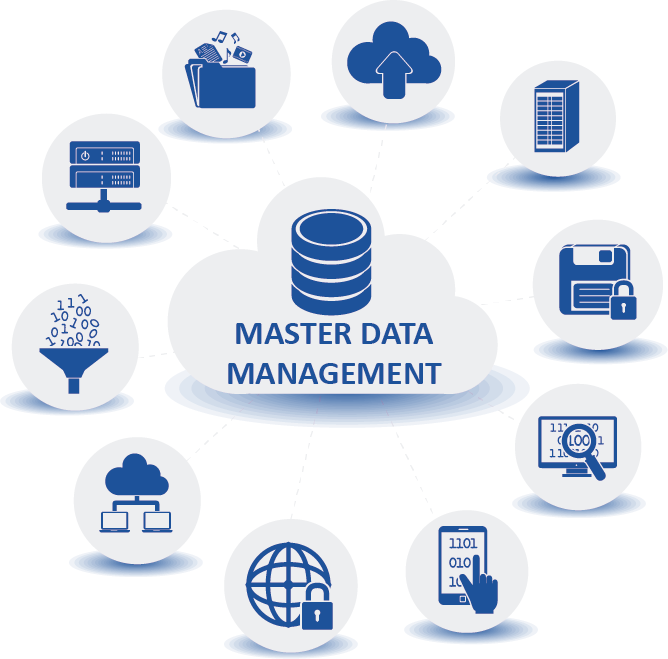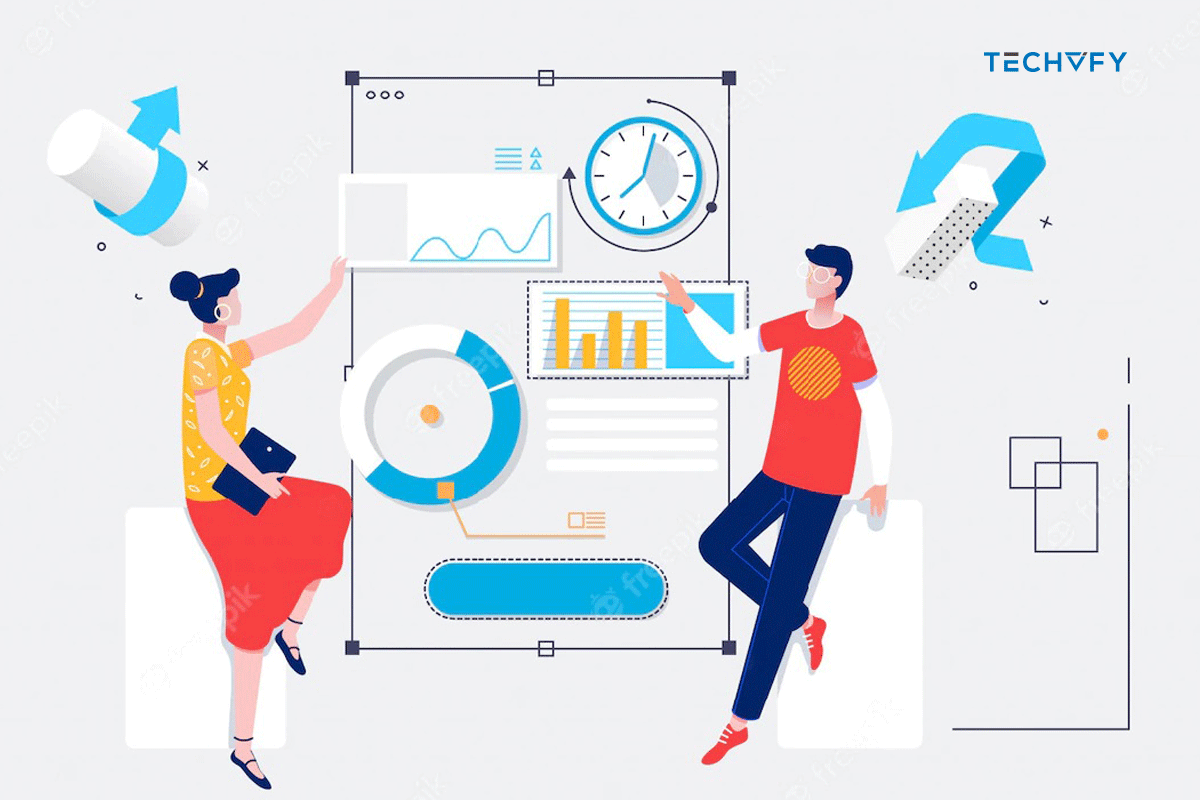What is Enterprise Data Management?
- TECHVIFY Team
- August 7, 2023
- Knowledge, Guides
- 0 Comments
Enterprise Data Management (EDM) has become a vital resource for contemporary companies, changing how corporations manage their data. Dating back to the early 1990s, EDM emerged as a response to the expanding complexity of data management. Since then, it has made incredible strides, adopting cutting-edge technology like machine learning and artificial intelligence to improve data processing and decision-making powers. In this article, we will discuss “What is enterprise data management?” along with its components, benefits, and top software options for data management.
I. What is enterprise data management?
Enterprise data management, often shortened to EDM, refers to inventorying, controlling, and integrating data from many sources inside an organization. It centralizes data in a standardized, secure, and managed storage while ensuring accurate and quick access to information among partners, subsidiaries, applications, and processes. These features enhance informed decision-making and data integrity and quality throughout its lifecycle.

Related Articles:
II. Components of enterprise data management
1. Data Integration
A successful enterprise data management strategy requires effective data integration. It involves seamlessly integrating data from diverse sources and formats into a single repository so that it is accessible and valuable. Businesses can combine data seamlessly to eliminate data barriers, maximize data use, and enable effective data-driven decision-making processes. There are many different forms of data integration, such as propagation, virtualization, consolidation, and federation.
2. Master Data Management (MDM)
Master Data Management develops and maintains a unified view of core business entities like customers, products, suppliers, and employees. It prevents duplication and inconsistent master data by ensuring consistency, accuracy, and up-to-date master data. With a trustworthy single version of crucial business information, centralizing and standardizing master data improves data quality and reliability, increasing data-driven decision-making.
3. Data Quality Management
Data received from various sources can be unorganized, unreliable, or even inaccurate. Making poor business decisions and hindering organizational growth are risks of using such data. Data quality focuses on maintaining data accuracy, consistency, and reliability throughout its lifecycle. Therefore, through data validation, cleaning, and other quality assurance efforts, firms can enhance data quality, increase operational efficiency, and acquire a competitive edge.
4. Data Governance
With the necessary structure and framework for efficient management of data assets, data governance is the foundation of data management. This factor ensures data integrity, quality, privacy, and compliance by establishing policies, standards, and guidelines. Enterprise data management companies can create a culture of ethical responsibility and accountability, regulatory standards, and smooth information flow across the enterprise with a proactive approach to data governance.
5. Data Security
Due to the dangers of cybercrime risks and growing concerns about the safety of personal data, data security is becoming increasingly significant. It involves implementing security measures like encryption, virtual private networks (VPNs), data lake services, or two-factor authentication to protect sensitive information. Moreover, using innovative technologies, such as blockchain and cutting-edge options, has become another strategic approach to improving data security further.
III. Benefits of enterprise data management
Let’s look at Enterprise Data Management’s (EDM) benefits now that we better understand “What is enterprise data management?” and its components. Learn how EDM can help businesses succeed and develop, from boosting data quality and optimizing workflows to improving decision-making and preserving data.
– Improve Data Quality
Establish strict data governance procedures to guarantee data accuracy, consistency, and reliability. With an emphasis on data cleansing and validation, organizations can rely on the preciseness of information for making crucial decisions and streamlining business processes.
– Optimize Workflows
This cutting-edge solution improves operational efficiency, reduces data redundancies, and minimizes manual interventions by centralizing and standardizing data management methods. As a result, businesses ultimately increase productivity and free up valuable resources.
– Enhance Decision-Making
Data enterprise management transforms decision-making across sectors by offering insightful information and streamlining processes. It improves financial risk assessment, customizes medical therapies, adjusts retail marketing plans, optimizes manufacturing procedures, and streamlines logistics and supply chain activities.
– Minimize Expenses
Cost reductions come from streamlining data processing procedures, storing data, and removing redundant data.
– Foster Innovation
Enterprise Data Management promotes an innovative enterprise culture by building a solid foundation of reliable data. Empowered with accurate information, teams can quickly react to market changes and identify new opportunities and cutting-edge solutions to stay ahead of the competition.
– Safeguard Data
Enterprise Data Management prioritizes data security through enhanced encryption, access controls, and robust data governance. By establishing a secure data management framework, organizations can reduce the risk of illegal access and data breaches, protecting their valuable assets and maintaining their reputation.
IV. Best enterprise data management software
Knowing the best enterprise data management software is essential for organizations looking to optimize their data management processes and maximize the full potential of their data.
1. Informatica
Offering a comprehensive suite of solutions, including data integration, quality, and governance, Informatica comes equipped with AI and machine learning capabilities to enrich master data records.
2. SAP
With a focus on centralizing and governing master data, SAP supports all master data domains and provides pre-built data models, rules, and workflows.
3. Semarchy
XDM, a part of this advancement, is a machine learning-powered solution for stewardship, matching, and data integration, allowing real-time and batch APIs for data source integration.
4. TIBCO EBX
This versatile platform manages master data, reference data, and metadata with self-service capabilities. It easily integrates with various applications like SAP, BCP, and TM1.
5. Pimcore
With the consolidation of master data across heterogeneous systems, this solution supports flexible data models and multiple implementation styles.
6. IBM
Manage critical enterprise data, ensuring compliance with data governance rules, available in both on-prem and cloud editions.
7. Oracle Data Integrator
Empowering high-volume, real-time data integration and transformation, Oracle’s ODI serves as an enterprise data integration platform, enabling seamless data flow across various systems.
8. SAS Data Management
Equipped with a comprehensive suite of data management tools, SAS covers diverse aspects, including data integration, quality, governance, and cataloging, ensuring a holistic approach to data handling.
Conclusion
In conclusion, understanding “What is Enterprise Data Management?” and its significance has become vital for modern businesses seeking success in today’s data-driven world. EDM gives companies more power by enhancing data quality, streamlining workflows, better decision-making, lowering costs, stimulating innovation, protecting data, and elevating the customer experience. This piece also provided a list of the best enterprise data management software, guaranteeing that companies can effectively manage their data and maximize its value. By adopting these solutions, businesses can survive in the era of data-driven achievement and successfully traverse the constantly shifting data landscape.
TECHVIFY – Global AI & Software Solution Company
From Startups to Industry Leaders: TECHVIFY prioritizes results, not just deliverables. Accelerate your time to market and see ROI early with high-performing teams, AI (including GenAI) Software Solutions, and ODC (Offshore Development Center) services.
- Email: [email protected]
- Phone: (+84)24.77762.666







